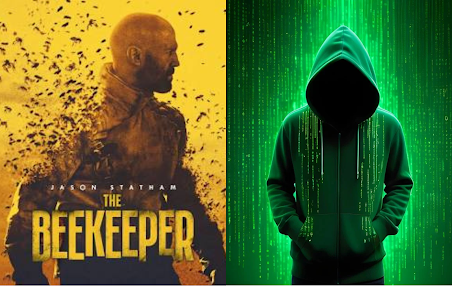Do you know how some movies just grab you from the opening shot? The Beekeeper did exactly that for me. From the moment it started, I was glued to my Turkish Airlines plane seat during our trip from Belgium to Texas, anticipating what would come. The mood was tense, but in a quiet, simmering way, like the calm before a storm.
The movie opens in a small, peaceful town –- a place that feels like home, with quaint houses and neighbors who know each other by name. And that’s when we meet Eloise Parker – this utterly warm and kind retired school teacher who is the epitome of grace. She lives for the simple joys in life – basking in the sunlit mornings in her garden and spending cozy evenings with her friends. You could almost feel the peace and warmth radiating from her scenes.
But then, bam! One day, she gets this seemingly harmless email -- the kind we all get, but we delete without a second thought – something about an account issue, asking her to click a link to verify her information. Watching it unfold on screen I felt a knot in my stomach. The email was all decked out with professional language, and official logos. Eloise, trusting and unsuspecting, fell right into the trap. I sat there, wanting to yell at the screen: Don’t click it! But of course, she does.
Ooh, the way the movie shows it – it’s not just a click. The moment she hit send, it was like the floor dropped from beneath her, and her whole life pivoted. The music shifts subtly, too, getting darker, and more ominous. It’s like watching a slow-motion car crash that you can’t stop. One minute, Eloise is still making tea in her cozy little kitchen, and the next, you see these shadowy figures on the other side of the screen, taking everything from her. It’s brutal. The audience feels her confusion and growing panic, as emails and phone calls from her bank start flooding in, asking if she authorized this or that transaction.
She tries to make sense of it all, calling her bank frantically, her hands trembling as she holds the phone. But it’s too late. Her life savings are gone. In an instant. The film doesn’t hold back – it makes you live through that horror with her. The feeling of helplessness, the crushing realization that her trust was weaponized against her.
What hit me the hardest was how personal this scam felt. It wasn’t just about the money. You could see in Eloise’s face that it was her dignity, her security, her peace of mind that was taken from her. She goes from being this joyful, almost grandmotherly figure, to a shell of herself. And we, the audience, are left sitting there, feeling the weight of her loss. It’s gut-wrenching.
It made me think about how easily anyone can fall prey to these kinds of scams. Three days ago, I found myself in a similar situation.
So, there I was, just casually surfing the internet, when suddenly this big Apple security warning exploded onto my laptop screen. It was one of those pop-ups that made your heart skip a beat.
“ACCESS TO THIS PC IS BLOCKED FOR SECURITY REASONS,” it blared, followed by a list of terrifying notifications:
- Email IDs
- Bank passwords
- Facebook logins
- Photos & documents
According to the message, my computer had been compromised by some Trojan spyware, and MacOS had detected adware capable of stealing my entire digital life. And, of course, it came with a dire warning: Call Apple Support immediately to fix this, or face the doom of identity theft and blocked access to your device!
Panic kicked in. My first instinct? I called the number on the screen. Yeah, I know – big mistake.
A sweet, charming voice greeted me on the other end of the line. She introduced herself as Charlene from Apple Support, and I felt a little reassured. She sounded so… professional. I told her about the scary message on my screen, and she told me to hang tight while she looped in the Apple “technical guys” for a report.
She asked me a few questions to “verify” my identity. You know, general stuff like if I was the laptop’s owner, and what other gadgets were connected to the WiFi at my location. I played along, but things got a little awkward when I casually mentioned I was just a guest at the house I was staying in – and that I was actually on vacation from the Philippines.
There was a brief pause on her end, but then Charlene came back with the supposed “technical report,” and that’s when things took a turn.
“Oh my gosh!” she gasped dramatically, her voice dripping with concern. “Seven hackers are attacking your system right now!” She then dropped the bombshell: “Our report shows that you’ve accessed four porn sites recently. Was that you?”
I couldn’t help but laugh. “Nope. Not me,” I said, feeling a little more confident now. Then she asked, “Do you have a credit card?”
“Nope.”
“Online banking?”
“None.”
“Any bank account?”
“Yeah, but I’m sorry to disappoint. I don’t have money. I’m a retiree living off my monthly pension from the Philippine government. I’m not worth hacking, trust me.”
There was a long silence. I could feel her frustration through the phone.
“Sir, we’re trying to help you here, but if you’re not willing to cooperate, we can’t resolve this issue,” she said, her tone sharp and irritated now.
It was at that moment I realized the tables had turned. They’d picked the wrong target – a guy with zero assets to his name (Could it be due to "riches" in my family name? lol) and no intention of falling for their phishing scam. I mean, seriously, I had nothing to lose. My wife holds the family's purse strings. I almost felt sorry for Charlene, stuck on the other end of the line, trying to salvage this failed scam.
She asked a few more desperate questions about my financials – bank names, deposits, etc. – but we both knew it was a lost cause. Finally, she muttered something about calling me back and hung up.
Just to be safe, I called actual Apple Support afterward. A very professional-sounding engineer named Justine ran a full system check on my laptop, confirming that it was perfectly fine – no malware, no hackers, no porn site history. Her final, crucial advice: Never call the numbers on those pop-ups.
In the end, what saved me? The simple, unvarnished truth – I don’t have big bucks in my name – funnily enough, turned out to be my best defense. They probably thought I was pulling their leg, but honestly, the joke was on them! And as it turns out, Jesus is right all along: The truth will set you free – even if that truth involves a monthly pension that makes you laugh (and cry).”
Content and editing put together in collaboration with ChatGPT
Head photo courtesy of Pixabay & The Beekeeper









No comments:
Post a Comment